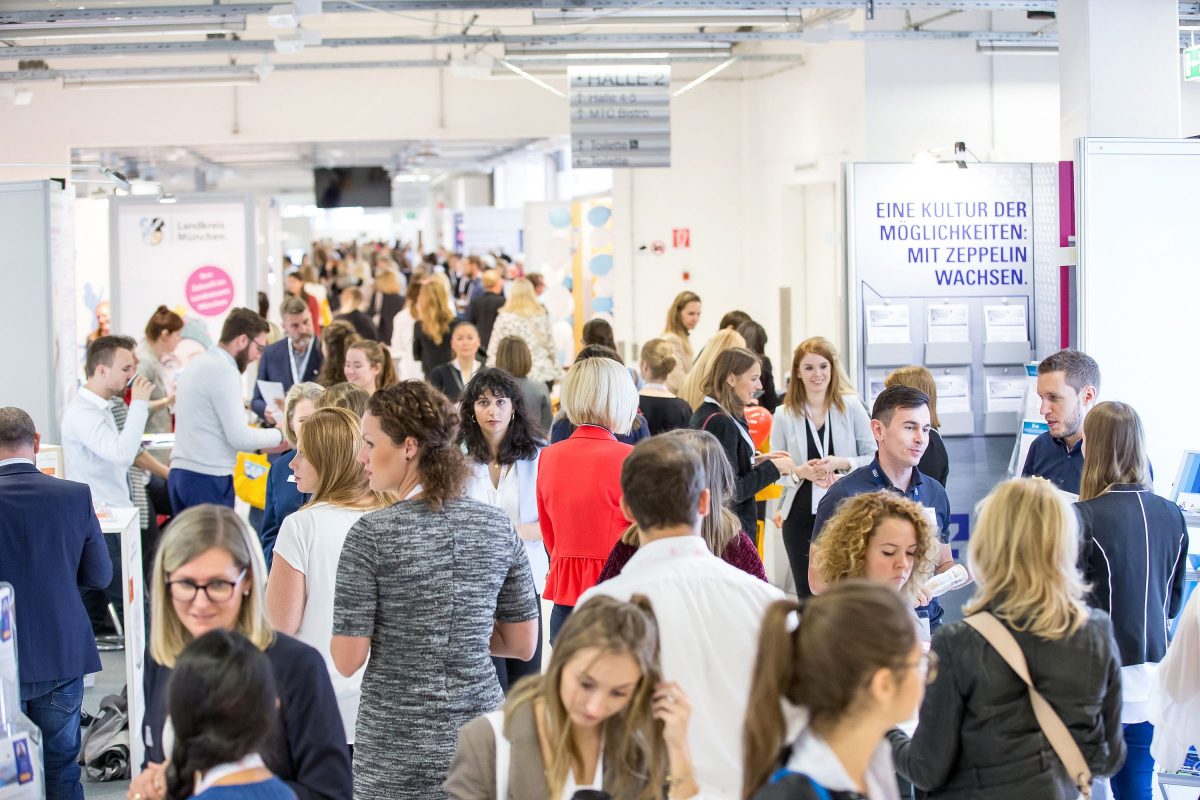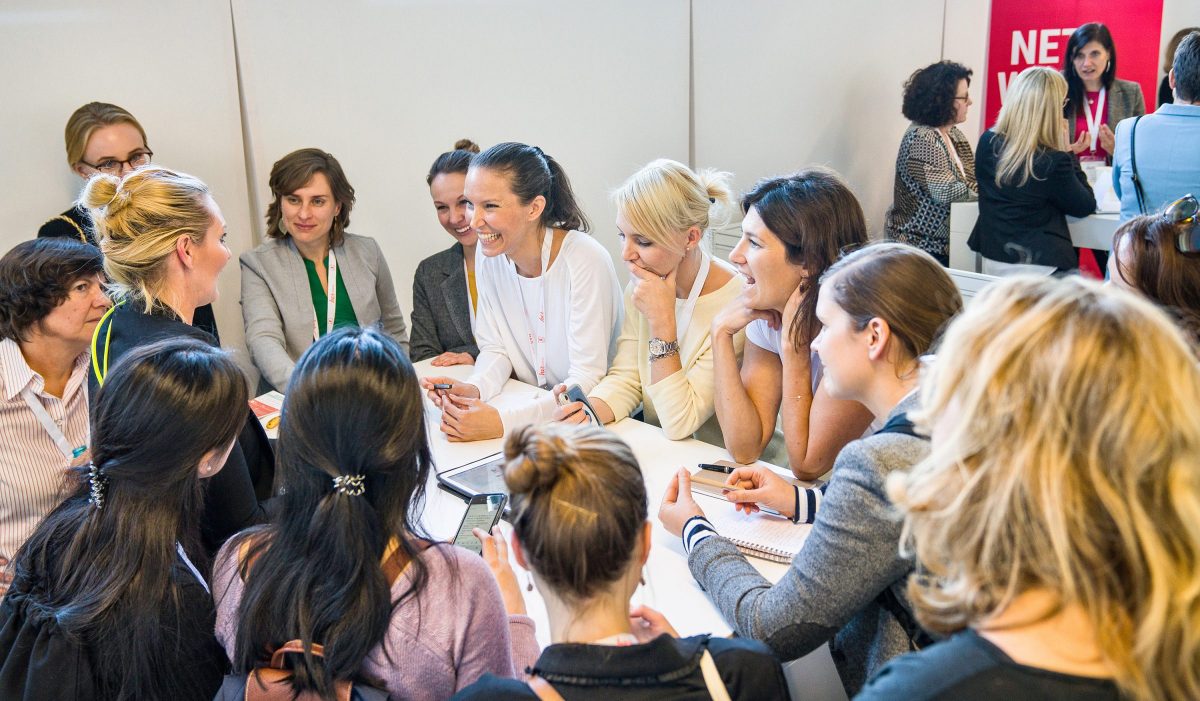Munich Startup: Was it your own experience or that of people around you that made you think there needed to be a career fair like herCareer? If yes, what experience was it?
Natascha Hoffner: Before becoming self employed, I worked for a trade fair organizer in Mannheim for more than 15 years. It was there that I learned everything about fairs from the bottom up and was already part of a newly founded company that I then became CEO of. After having my first child, I went right back to work full time after parental leave. It was my partner who mainly took care of our child in Munich 400 kilometers away. After our second child, that set up became difficult, which was also because getting back into management wouldn’t have worked easily. So I followed my family to the Munich area and then founded Messe.rocks GmbH in April 2015 and initiated herCareer, which has since become the leading career fair for female career planning and is much more than “just” a fair. We’re a meeting place and offer further training, a network and job platform all in one. The idea that it should take more than 100 years for men and women to be equal is something I couldn’t just simply accept at that point. It was clear to me that I wanted to commit myself to making sure that women have the same opportunities in the working world.

Munich Startup: What should visitors ideally take away from the fair?
Natascha Hoffner: That can be quite different depending on the reason for going to the fair. A fair should present offers and information and support the visitors in their specific career phase so they can progress towards attaining their aspirations and expectations – be it a new job, the right offer for further training, partners to found a company or tapping into some new energy for their own company. We also touch on topics such as work-life balance, money issues, finances and investments. What makes herCareer special are the many formats that are offered to expand participants’ professional and personal networks – across all hierarchies. The exhibiting companies and partners make this possible not so much with the classic speech format, but instead with more than 350 meetups and talks in small groups. This is where role models have a chance to speak and sparring partners share their knowledge, experience and learning curves. The idea behind it is that we want to do more than encourage our visitors to take new career paths. We want to keep women and men from making the same “mistakes” and from having to go through the same bad professional experience. herCareer offers first-hand potential solutions and more positive experience with personal tips – along the lines of “this is how I solved that.”
“Unconscious bias against women plays a major role”
Munich Startup: “Female founder” is a common buzzword in the startup scene – in actual fact, however, Dealroom has reported that only 10.9 percent of Munich startups have one or more women in their founding teams. Do you feel like things have changed a bit in the startup scene in recent years?
Natascha Hoffner: Not really – and it doesn’t look much better in the rest of Germany either. The latest Female Founders Monitor (FFM) 2020, a joint study carried out by Bundesverband Deutsche Startups and Google for Startups, showed that the percentage of female founders has stagnated at a mere 15 percent. Only one in every ten companies in Germany is built by an all-woman team and the management of just 20 percent of companies is mixed. The rest of the bosses are men – and they get the most capital. While a startup run by men in Germany can raise an average of 10.6 million euros, the Boston Consulting Group (BCG) has reported that female founders receive an average of 3.5 million euros, so just shy of a third. Unconscious bias against women plays a major role.
The percentage of female founders is still much too low. What I have also noticed, however, is that starting a company is an option for women and that there are more and more public discussions about female founders and about how we can make them visible as role models. But gaining access to capital is still more difficult for women. It’s often family and friends who give them money to start a company. The investor landscape is very much male. The percentage of female partners in German VC companies is just four percent according to BCG.
Many women have a very strong will to succeed and have the necessary staying power to start a company. They often battle their way through with no or much less outside capital than men. You often hear: “If these women really want to achieve something, they’ll do it.” But they also have to give up so much, have to give up time for their private lives and deliver even more – that is not talked about enough. And most especially that women and men do not have the same opportunities when founding a company.
Munich Startup: Do you think it’s important for more women to start companies in Germany?
Natascha Hoffner,: Of course, startups are the future of our economy – and women should be able to help shape it. Women often have a different focus when it comes to new products and solutions – not least because they might also be part of the primary target group. On top of that, I’ve often personally noticed that women start thinking based on the problem itself and ask themselves what technology can be used to solve it. Then they build a network to help them reach their goals. An excellent example is Judith Gampe, who created an earring with an integrated headset. Or also Julia Römer, founder of Coolar, a refrigerator that cools using heat instead of electricity, which makes it possible to save more than 60 percent of all carbon emissions and more than 75 of running costs. Moreover, Coolar can help keep medicine and food cool in regions without power.
Men and women should be equally involved in innovations so they don’t serve just one part of humanity.
So I do ask myself why so little has changed. It’s well known that it’s not only difficult for women to access capital, but also that they receive a lower rating for the exact same pitch deck – #unconscious bias. Investors ask different questions depending on gender. Researchers at the Harvard Business School and the London School of Economics discovered that men are asked about potential for gains and women about the potential for losses – and that this significantly reduces the amount of funding given to female founders. According to a BCG study from 2019, startups run solely by women have a 40 percent lower chance than men of making it to the crucial second round of growth capital across all stages of startup financing. In the third round, the probability of receiving a fresh influx of funding is even 90 percent less for women.
Munich Startup: Should women adapt to the working world that was made by and for men – or does the system need to change?
Natascha Hoffner: That’s a rhetorical question, right? Of course, it’s necessary to question the system behind this discrimination. I can remember so many panels or female (founder) tracks on the topic at a broad range of events. They’re usually held by high ranking women and the content is also excellent – but they also only speak to women. And that’s because women are interested in becoming leaders and in starting companies. But what happens then, is the discussion and the “solution” are usually left for women to figure out. But that won’t work. The beneficiaries of the current system are still primarily men. And when it’s a matter of giving up power, the majority of them are not going to cry out “yes” and make room.

The reality is that women are more educated now than ever before. It think it’s negligent to not want to take advantage of this talent considering the challenges we currently face. Women give so much to be visible and catch up with men: They start companies, create family-friendly structures, become investors – but even more is possible. On the one hand, there is certainly a need for new regulations from the political realm and funding authorities. Quotas can also be useful as a transitional tool for changing the system, and it’s also a matter of new conditions for capital decisions. Which is why Dorothee Bär suggested a quota (for women) for public venture capital and also the Young Digital Economy advisory board is looking at the approach on behalf of BMWi.
Munich Startup: Apart from legal changes, what do you think needs to happen for more women to take the leap to becoming self employed?
Natascha Hoffner: That starts with a new attitude among financiers, which is why the existing inequality and unconscious bias cannot be stressed enough. Furthermore, while many women can imagine starting a company, they also are understandably quite scared of failing under such circumstances. There need to be more opportunities for low-threshold founding. With herCareer, we’re here as a platform for discussing everything involved in starting a company. Women can’t solve the problem on an individual level – they need networks and role models to encourage them. We also provide support with our male founder pitch: Male founders and founding teams have the opportunity at the fair (as long as slots are available) to pitch for a co-founder or female colleague to fill a C-level position. Diverse teams are possible when we organize these kinds of encounters and step outside of our own comfort zones.
“The fact that the number of female networks is increasing is fantastic”
Munich Startup: And last but not least: How important are networks? Should women simply copy men’s networks or can they make them smarter and, above all, more inclusive?
Natascha Hoffner: Networks are always beneficial for a career – regardless of whether it’s a matter of networks within a company or beyond. The fact that the number of female networks is increasing is fantastic. They give women a “safe” place to talk openly about their challenges and receive advice. And yet it’s still predominantly men who are pulling the levers in the economy, which means that women should also count on mixed networks within their industries and for their topics of interest. But once again, making networks more inclusive can’t be just be left up to women. What’s needed are patrons, sponsors and supporters, both men and women, who are ready to have more women at the table, to open doors and, if needed, also stand behind these women. A network is worth its weight in gold.
